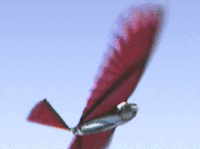
Photo from wikipedia
An unmanned free-swimming submersible (UFSS) is designed to perform certain tasks in water without interposing humans. The vehicle’s control is achieved by integrating mathematical (analog) and non-mathematical (embedded) controllers. The… Click to show full abstract
An unmanned free-swimming submersible (UFSS) is designed to perform certain tasks in water without interposing humans. The vehicle’s control is achieved by integrating mathematical (analog) and non-mathematical (embedded) controllers. The main goal of integrated controllers is to overcome the environmental disturbances and noise of the sensor data. These disturbances, as well as the noise data, are generated during steering, diving, and speed control. The amplitude of disturbances and noise varies with the depth and intensity of water waves. This article presents a robust hybrid linear quadratic regulator (HLQR) controller for UFSS. The presented controller targets the desired state of the UFSS in the presence of a disturbing environment. The hybrid approach is achieved by employing: (1) two linear quadratic regulators or controllers and (2) a mathematical structure of the Riccati equation. Consequently, the proposed HLQR controller is integrated into the UFSS system to evaluate the response in terms of settling time, rise time, overshoot, and steady-state error. Furthermore, the robustness of the HLQR is investigated by considering the feedback to step response and hydrodynamic disturbances. The implementation results reveal that the proposed controller outperforms state of the art controllers, such as proportional-integral-derivative and lead-compensator controllers.
Journal Title: Applied Sciences
Year Published: 2021
Link to full text (if available)
Share on Social Media: Sign Up to like & get
recommendations!